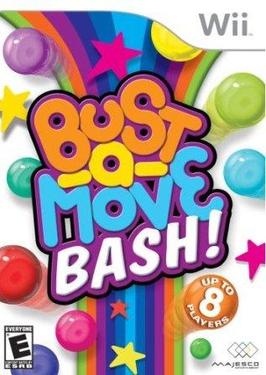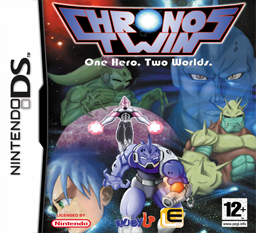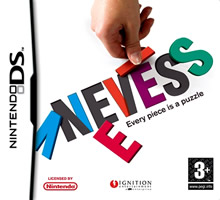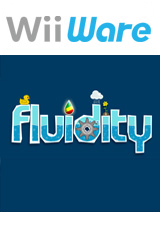
WarioWare: Smooth Moves is a party video game developed by Nintendo and Intelligent Systems and published by Nintendo on the Wii. It was released in Japan in December 2006, and in Europe, North America, and Australia in January 2007. It is the fifth game in the WarioWare series of games, and the only game in the series to be physically released for the Wii. Like its predecessors, WarioWare: Smooth Moves is built around a collection of microgames that last about five seconds each, and which require that the player hold the Wii Remote in specific positions. The game offers the microgames to the player in rapid succession, by first instructing the player to hold the Wii Remote in a specific manner, and then showing them the microgame. The microgames are divided into several stages, each of which loosely connects the microgames with the help of a story. Additionally, this was the first spin-off Mario game to be released for the console.

Bust-A-Move Bash!(known in Europe as Bust-A-Move) is a bubble shooter tile-matching video game released exclusively for the Wii, as part of the Bust-A-Move series. It is the first Bust-A-Move game released on a Nintendo console after Bust-A-Move 3000, released in 2003 on the GameCube.

Chronos Twins, known in the PAL region as Chronos Twin, is an action-adventure game developed by Spanish studio EnjoyUP Games, released in the PAL region in 2007. It was also released in North America on January 18, 2010 and in Europe on May 14, 2010 as a download for the Nintendo DSi system. The game puts a different perspective on time travel than most games. Instead of revisiting an area in two different times, both screens show the same setting during two eras as gamers explore the land with a present-day hero. Chronos Twins was originally planned for release for Game Boy Advance, but after the rise of the Nintendo DS, the game's development switched to that system. An enhanced version for the Wii console entitled Chronos Twins DX was released in North America as a WiiWare download one week prior to the Nintendo DSi release. It was later released in the PAL region for WiiWare on April 2, 2010.

Safecracker: The Ultimate Puzzle Adventure is a 2006 puzzle adventure game developed by Kheops Studio and published by The Adventure Company. It is the spiritual successor to Daydream Software's 1997 title Safecracker.

Dr. Mario Online Rx, stylized as Dr. Mario Online ℞ and released in PAL regions as Dr. Mario & Germ Buster, is a puzzle video game starring Dr. Mario. It was one of the WiiWare launch games in Japan, Europe, and Australia, and was released in 2008 on March 25 for Japan, on May 20 for Europe and Australia, and for North America on May 26.

Neves, known in Japan as Hamekomi Lucky Puzzle DS, is a puzzle video game developed by Yuke's Media Creations for the Nintendo DS, based on the Japanese Lucky Puzzle, a tangram-like dissection puzzle. In the game, players use the stylus to move, rotate and flip pieces on the DS's touch screen to clear puzzles. It features over 500 different puzzles from which to choose.

Lit and also known as School of Darkness in Japan, is a puzzle video game developed and published by WayForward Technologies for WiiWare. The game is directed by Adam Tierney and co-designed by Tierney and Mark Bozon. It was released in North America on February 9, 2009. A remake with a cel-shaded art style was released on Android and iOS on October 29, 2015, and Windows in February 2017.

Bomberman Blast is an action game developed and published by Hudson Soft for the Wii and WiiWare as part of the Bomberman franchise. The game was released as two versions: a fully featured retail release and a WiiWare version known as Wi-Fi 8-Nin Battle Bomberman. The retail version was released in Japan on September 25, 2008, while the WiiWare version was released on September 30, 2008. The WiiWare version was released in Europe on September 12, 2008, and in North America on September 29, 2008.

Tetris Party is a puzzle video game by Hudson Soft for WiiWare. An installment of the Tetris series, the game supports the use of Miis and the Wii Balance Board, and features both local and online multiplayer in addition to several single-player modes unique to the game.

NyxQuest: Kindred Spirits is a platform game, originally released for WiiWare by Spanish developers Over the Top Games. It was released in 2009 for the PAL regions on June 19, and for North America on August 10. The game was later released in Japan on May 11, 2010. Versions for Windows and Mac OS X were released on September 27, 2010 through the game's official website and Steam. The game was ported to the iOS as NyxQuest on July 6, 2011 and to the Android on March 20, 2019.

MySims Racing is a go-kart-car racing game developed by Artificial Mind & Movement and published by Electronic Arts as part of the MySims series, a spin-off from its trademark The Sims series of games. The title was released in June 2009 for the Nintendo DS and Wii.

Mighty Flip Champs! is a puzzle-platform game developed and published by WayForward Technologies for the Nintendo DSi's DSiWare digital download service. It was released on June 1, 2009, in North America and on November 27 in the PAL regions. The developers took inspiration from multiple sources, including the video games Wendy: Every Witch Way and The Legend of Zelda: A Link to the Past. In it, players control Alta, a girl who has to reach a fishman by flipping between areas until she can reach him. Since its release, Mighty Flip Champs! received all-around positive reception, while also being called one of the best video games for the DSiWare service. It is the first game in the Mighty series, and is followed by Mighty Milky Way, Mighty Switch Force! and Mighty Switch Force! 2.

Contra ReBirth is a 2D run and gun video game developed by M2 and published by Konami for WiiWare. It is the twelfth original installment in the Contra series. It was released in Japan on May 12, 2009, the PAL region on September 4, 2009, and North America on September 7, 2009.

Zombie Panic in Wonderland, known in Japan as Zombie in Wonderland, is a third-person shooter for Wii released in 2007 by Spanish videogame developer Akaoni Studio. The game was first released in Japan by Marvelous Entertainment on December 20, 2007. It was later released by Akaoni Studio in 2010 for Europe and North America. An updated version of the game, Zombie Panic in Wonderland Plus, was released on the iTunes App Store for the Apple iPod Touch, iPhone and iPad, and on the Google Play Store for Android devices in 2012, but was since taken down. Another version of the game, Zombie Panic in Wonderland DX, was released for Nintendo 3DS on October 30, 2014, for iOS devices on April 5, 2015, for Nintendo Switch on January 25, 2019, and for Microsoft Windows via Steam on November 6, 2019.

Pac-Man Party is a party video game by Namco Bandai Games for the Wii, Windows Mobile, and Nintendo 3DS. It is similar to the Mario Party series and Monopoly games for the Wii. In the game's story mode, players must retrieve a stolen cookie recipe from Pac-Man's enemies Blinky, Pinky, Inky, and Clyde and return it to its rightful owner, Mr. Cookie. The game was released to coincide with Pac-Man's 30th anniversary. The game notably features redesigns of the main characters which would carry over to following Pac-Man titles in the mid-2010s, culminating with Ghostly Adventures.

3D Pixel Racing is an arcade-style racing game developed by Vidia and released in 2011. The game was released as a downloadable game on WiiWare and in the App Store for iOS devices. 3D Pixel Racing heavily capitalizes on its graphical uniqueness. Unlike most 3D games, every object in 3D Pixel Racing is made of multi-colored voxels that are reminiscent of old 8-bit games from the 1970s and 80's.

Ketzal's Corridors, known in PAL regions as SpeedThru: Potzol's Puzzle and in Japan as Shissō Surinuke Anatōsu, is a puzzle video game, developed by Keys Factory and published by Nintendo. It was released on the Nintendo 3DS via the Nintendo eShop. The game is a follow-up to Keys Factory's ThruSpace, released on WiiWare in 2010.

Fluidity: Spin Cycle is a physics puzzle game developed by Curve Studios and published by Nintendo for the Nintendo 3DS eShop. The game is a sequel to the WiiWare game Fluidity, which focuses on controlling a small body of water that is utilized in its different states of matter to progress through the game's levels. Fluidity: Spin Cycle was released in the PAL region on December 13, 2012, in Japan on December 19 under the name Gurutto Splash!, and in North America on December 27.

Little Inferno is a puzzle video game developed and published by American independent game developer Tomorrow Corporation. The game was released for the Wii U in November 2012 in North America, Europe and Australasia. Microsoft Windows, iOS, OS X, Linux and Android versions followed throughout 2013. A Nintendo Switch version was released in March 2017 in North America, Europe and Australia.

ThruSpace, known in Europe as ThruSpace: High Velocity 3D Puzzle and in Japan as Surinuke Anatōsu (すりぬけアナトウス), is a 2010 WiiWare game, developed by Japanese game developer Keys Factory, and published by Nintendo. Players play as a block known as a "Keydron", and use the Wii Remote to rotate the Keydron so it will fit in gaps in walls that approach it.

















